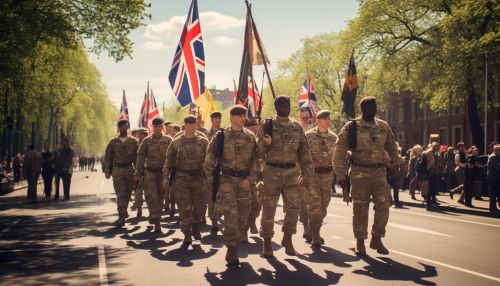Allies of World War II
Introduction
The Allies of World War II, also known as the United Nations, were a group of countries that together opposed the Axis powers during the Second World War. The Allies promoted the alliance as a means to control German, Japanese and Italian aggression.


Formation and Membership
The Allies were formed in 1939, in response to the aggressive expansion of Nazi Germany under Adolf Hitler. The original Allies were the United Kingdom, France, and Poland. However, the alliance quickly grew to include many other nations.
The Soviet Union joined the Allies after being invaded by Germany in 1941. The United States and China also joined the Allies in 1941, following the Japanese attack on Pearl Harbor and the subsequent declaration of war by Germany and Italy.
Military Strategy
The Allies' military strategy was primarily focused on defeating Germany and Japan. The strategy involved a combination of strategic bombing, blockade, and large-scale land and sea invasions.
The Allies also made extensive use of intelligence and code-breaking operations. The British, in particular, were successful in breaking several German and Italian codes, which provided valuable information for planning military operations.
Major Campaigns and Battles
The Allies were involved in numerous campaigns and battles throughout World War II. Some of the most significant include the Battle of Britain, the North Africa Campaign, the Battle of Stalingrad, the Normandy Invasion, and the Battle of the Bulge.
In the Pacific, major battles included the Battle of Midway, the Guadalcanal Campaign, and the Battle of Iwo Jima.
End of the War
The war in Europe ended with the unconditional surrender of Germany in May 1945. The war in the Pacific ended with the surrender of Japan in September 1945, following the dropping of atomic bombs on the cities of Hiroshima and Nagasaki by the United States.
Aftermath and Legacy
The end of World War II resulted in significant changes in the global political landscape. The United Nations was established to foster international cooperation and prevent future conflicts.
The Allies also held a series of military tribunals, known as the Nuremberg Trials, to prosecute prominent leaders of Nazi Germany for war crimes.
